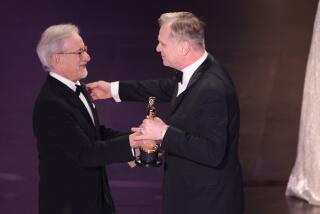Forgotten Gems Still Have Oscarâs Prints All Over Them
With time winding down to Mondayâs Academy Awards ceremonies, some movie fans are no doubt rushing to cinemas with their lists of Oscar picks, trying to catch the pictures that all year theyâve been âmeaning to see.â But now is also as good a time as any to remember some past Oscar winners that have unfortunately fallen into relative obscurity, and might be languishing on the video store shelf while you see âGhostâ for the umpteenth time.
A good starter for your Oscar-discovery list would be 1935âs âThe Informer.â This film won Best Actor for Victor McLaglen and Best Director for John Ford (who would later direct such greats as âStagecoachâ and âThe Searchersâ). Here, Ford focuses not on the sweeping vistas of Monument Valley but on the tight, dark quarters of strife-torn Dublin. Fordâs keen visual style is as visible here on the streets of Ireland as it is on those Western plains.
The story takes place in the divided Ireland of 1922. The IRA is on the rise, and soldiers are everywhere. In this cramped and frightening environment, Gypo Nolan (McLaglen) betrays his best friend for 20 pounds--the price of passage for two from Ireland to the United States. But he never gets to take his girlfriend on that trip. Gypo is a large man, a likable man--but not a very smart man. McLaglen is superb in this role, and if his name is unfamiliar, his face certainly is not--other great performances were in such films as âGunga Dinâ and âThe Quiet Man.â
Skipping ahead to 1943, Paul Lukas netted the Oscar for Best Actor when he played Kurt Muller, leader of a group resisting Nazi rule, in âWatch on the Rhine.â You may remember him as the scientist in â20,000 Leagues Under the Sea,â but his performance here just might replace that memory. He rises well above the material given him by screenwriters Dashiell Hammett and Lillian Hellman, even stealing his scenes with Bette Davis--by no means a small feat.
In this story, Muller has come to the States with his American wife to gather money for the resistance and recuperate from an injury. Unfortunately, the tendrils of the Nazi empire have snaked their way across the Atlantic and his life is endangered. This film does have its layers of propaganda, but it also (quite remarkably for its time) shows that people with thick German accents are not necessarily Nazis. They, too, have families and loves--and some a hatred for fascism.
(For history buffs, this was the year of âCasablanca.â It won Best Picture but left Humphrey Bogart neglected. Nothing against Bogie, but if youâre wondering why, take a look at Paul Lukasâ performance. It was a tough year.)
Four years later, Ronald Colman (of âLost Horizonâ fame) won Best Actor for his performance in âA Double Life.â He portrays an actor who loses the distinction between himself and his roles, which becomes a problem when he plays Othello opposite his ex-wife. If that sounds like the makings of a great screwball comedy, it is not treated as such. Scriptwriters Ruth Gordon and Garson Kanin take the dramatic tack--and pull it off. Itâs sweaty-palms time when Colman starts to lose touch with reality inside the apartment of luckless waitress Pat Kroll (Shelley Winters)--and begins acting out the strangulation scene from âOthello.â The film has many fine performances and intelligent, snappy dialogue.
If itâs great dialogue you enjoy, there are some absolutely brutal exchanges in 1949âs âThe Heiress.â Olivia de Havilland won Best Actress for her role as a young 1840s woman who stands to inherit a great deal of money. The problem is she is shy and not very skilled in the social graces. Thus her father, played by Ralph Richardson, is very suspicious when young Morris Townsend (Montgomery Clift) comes calling . . . and proposing, in rapid succession. Is Townsend a gold digger? Quite possibly, but the daughter is not allowed much chance to find out, and in the ensuing power play she discovers that her father never really cared much for her. One can sympathize when the daughter turns cold and vengeful toward him. This is one of those films that draws you in to the point that you find yourself talking to the screen.
Skip now to 1965 and Julie Christie winning Best Actress for her role in âDarling.â She portrays a supermodel by the name of Dianna (The Happiness Girl) Scott. In truth, the character is more of a supersocial-climber than anything else. She sleeps with whomever can help her career and then discards them. By the time she finishes her climb--as princess to an Italian prince no less--she discovers that itâs very lonely at the top when all you have is yourself, and that person is someone to be despised. Christie does a wonderful job at keeping us fascinated with the character. She makes you feel pity for a person most people would find loathsome. Dirk Bogarde deserves special mention as the broadcaster who falls for her and sends her on her journey upward. You feel most deeply for him as he finds himself alone, floating in Dianna Scottâs wake. A sad film, yes, but the excellent performances make it well worthwhile. Add this to the fact that âDarlingâ also won the Academy Award for Best Screenplay and you have a film that deserves to be rented.
âThe Informerâ (1935), directed by John Ford . 91 minutes. No rating.
âWatch on the Rhineâ (1943), directed by Herman Shumlin . 114 minutes. No rating.
âA Double Lifeâ (1947), directed by George Cukor . 104 minutes. No rating.
âThe Heiressâ (1949), directed by William Wyler . 115 minutes. No rating.
âDarlingâ (1965), directed by John Schlesinger . 122 minutes. No rating.
More to Read
Only good movies
Get the Indie Focus newsletter, Mark Olsen's weekly guide to the world of cinema.
You may occasionally receive promotional content from the Los Angeles Times.










